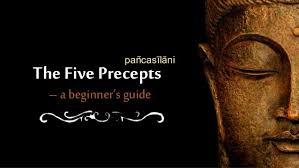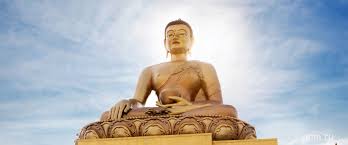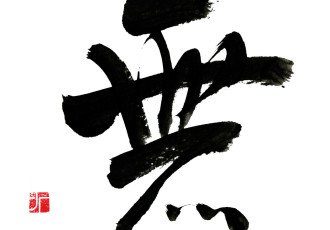The Five Precepts – termed as pancasila in Pali, constitute the basic ethical guidelines taught by the Buddha for lay practitioners. They are known as the “basic” precepts as they are considered to command the minimum moral obligation of a practicing lay Buddhist. The precepts are taken voluntarily, usually in a formal ceremony. In the Abhisanda Sutta, the Buddha called the Five Precepts the “five great gifts” that bestow “freedom from danger, freedom from animosity, and freedom from the oppression of limitless numbers of beings.” They are also called The Five Perfections or The Five Moral Precepts.
The Five Precepts fall under the “right speech”, “right action”, and “right livelihood” of the Eight-fold Path, and are prerequisite for the cultivation of concentration and wisdom. With the practice of observing the precepts, we are more aware of our body and speech, attitude which is leading us towards mental stillness and clarity, and ultimately, to liberation from suffering.
The Five Precepts are the most universal code of conduct the Buddha encouraged followers to practice. The concept behind the Five Precepts was not a set of rules, but rather a personal vow to adhere for the benefit of others. There are often described as “training rules” as well. Not every person gets the Five Precepts right the first time, or hundredth time, but every Buddhist disciple who undertakes the Five Precepts makes a gradual, steady effort to eventually perfect them.
The Five Precepts are also known as the Dhamma of the human beings, as these are the moral conducts for a skillful life. The Five Precepts have been designed to restrain a Buddhist from having an unwholesome speech and body behaviour, and to serve as the basis for further growth in the Dhamma. To be a real Buddhist, one has to observe The Five Precepts. A Buddhist is one who takes refuge in the “Triple Gem” (Tissrana), namely the Buddha, Dhamma and Sangha.
The Five Precepts are:
1 – The precept to abstain from taking life. The central tenet of Buddhism is ahimsa, or non-harming, which teaches the sanctity of all life—humans, animals, plants, and even the environment. “Taking life” means to murder anything that lives. It refers to the striking and killing of living beings. Hence, the first precept helps us engender compassion for ourselves and all living beings. In its literal meaning, the first precept imply the moral obligation to refrain from killing of all living beings, because in Pali pana means breathing – referring to living beings with a breath and consciousness. In a broader perspective, this precept which is based on compassion prohibits not only killing, but also hurting and torturing all living beings. Despite the literal meaning of the precept that prohibits the killing of other living beings, the noble meaning behind it commands the observer a commitment to ‘refrain from killing his own self’. This precept applies to all living beings, not just humans. All beings have a right to their lives, and that right should be respected.
2 – The precept to from taking what is not given. “To take what is not given” means the appropriation of what is not given to us by others. It refers to the removing of someone else’s property, to the stealing of it. Aside from stealing, this may also include consuming more than necessary, wasting resources, or exploitation. Instead, the Buddha encouraged us to practice dana, or generosity. This precept is based on the observance of right to property and its enjoyment free from unethical interference that anyone in this world is entitled to. Stealing someone’s property generally has the opposite effect – of making us realize how much we are attached to it, and this is the reason why buddhism puts forward the ideal of renouncing of the attachment and practicing generosity. Hence, it encourages a right means of livelihood in the person observing the precept.
3 – The precept to abstain from sexual misconduct. “Sexual misconduct” is an extremely blameworthy bad sexual behavior. “Sexual misconduct” is the will to transgress against those whom one should not go into, and the carrying out of this intention by unlawful physical action. This precept pertains to avoiding causing harm through sexual behavior, or avoiding sexual activity which is exploitative in any way. This includes sexual assaults, infidelity, promiscuity and, for some Buddhists, premarital sex. Being aware of the suffering caused by sexual misconduct, we can exercise responsibility and strengthen the integrity of our personal relationships.
4 – The precept to abstain from false speech or lying. This precept invites us to use words wisely, truthfully, and kindly. Just as actions of the body can inflict harm, so too can be done by the words. Buddhists aim to seek truth and wisdom; lying and deception only increase delusion and ignorance. The literal obligation is to prevent from telling all sorts of lies, including both direct and indirect, with an intention to deceit. This precept focuses on avoiding false speech of all kinds, with the positive counterpart of truthfulness. Truth is not only emphasized because lies can be harmful, but because Enlightenment is seen as a state in which truth is understood. The whole Buddhist Path is thus a quest for the truth (in a sense in which factual and moral truth come together).
5 – The precept to abstain from liquors, wines, and other intoxicants, which are the basis for activities tainted with confusion. Buddhism emphasizes wisdom and clarity of mind. It teaches us to “look within” to find our Buddha nature. Intoxicants cloud our minds and thus impair our ability to practice. Furthermore, when intoxicated, we are prone to transgress the previous four precepts. The literal meaning demands a commitment to abstain from taking intoxicants that can impair one’s ability to think and act. Impairment of consciousness by intoxication could cause one to engage in unwholesome activities. The essence of the precept is to abstain from intoxication by harmful drugs or alcoholic drinks, but also by his own unskillful thoughts. Intoxication that is caused by ‘pride’, ‘arrogance’ or ‘conceit’ could be more harmful to one walking in the noble path, and could represent a real obstacle to achieve Nirvana. Therefore, by adherence to the fifth precept, one should avoid all forms of intoxication that can obstruct the reaching of this ultimate state.
One ceremonial version of the precepts can be found in the Treatise on Taking Refuge and the Precepts, and goes like this:
- As all Buddhas refrained from killing until the end of their lives, so I too will refrain from killing until the end of my life.
- As all Buddhas refrained from stealing until the end of their lives, so I too will refrain from stealing until the end of my life.
- As all Buddhas refrained from sexual misconduct until the end of their lives, so I too will refrain from sexual misconduct until the end of my life.
- As all Buddhas refrained from false speech until the end of their lives, so I too will refrain from false speech until the end of my life.
- As all Buddhas refrained from alcohol until the end of their lives, so I too will refrain from alcohol until the end of my life.
photo credit: pancasilani




